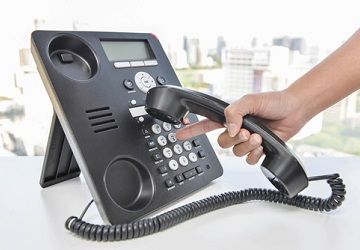Improving Your Practice's Use of the Phone
If you've ever had someone answer your phone call and immediately place you on hold, you know how patients often feel: neglected, and overlooked. Don't overlook the value of the phone when it comes to recruiting new patients and retaining existing ones. It reinforces the human connection that people crave.

Prospective dental patients may be avoiding your practice just because of how your front desk staff handles phone calls.
In today’s technological climate, it’s easy to overlook one of the most basic forms of communication — the phone – as a key tool in your tool chest to grow your patient base. Unfortunately for many dentists, phone communication often gets lost in the shuffle.
“(Dentists) have become blasé or passive in understanding that a phone call is a direct connection to potential patients,” says Janice Hurley, an executive coach and principal of The Image Expert.
Hurley says that too often staff see phone calls as a bother, and will let a call go to voicemail if a patient is standing at the front desk. Or, they pick up the phone and say, “Will you hold please?” before allowing the caller to identify themselves. In other words, they make the mistake that the person in front of them is more important than the person calling in. But in reality, the person in front of them already has a relationship with the practice.
“They’ll understand when you say, ‘Excuse me while I get this,’” Hurley says. “And make sure to keep giving them eye contact.”
LACK OF TRAINING
Hurley explains that a mistake dental practices frequently make is undertraining team members on how to answer the phone. The person answering the phone should be knowledgeable, have good self-esteem, and sound delighted to be speaking with the person on the other end. To that latter point, Hurley says recording phone calls and listening to the playback should be standard operating procedure for every practice.
“Unless all of us take time to listen to our audio renditions of what we’re saying to other people, we would have no idea how we sounded,” she says. “Without adequate training, two things happen: We’re not setting that person up for success, and we’re communicating oftentimes to the patient that the quality of care that’s taking place in the back is not at all being represented by the person at the front.”
Hurley says that at In-N-Out Burger, staff are constantly being recorded for the quality and level of interaction with customers. It’s standard training for all personnel. Why not at a dental practice? Why not make it clear to staff that answering the phone without sounding rushed or immediately putting the caller on hold is a priority?
Potential patients, Hurley explains, may be working off a provider list obtained from their insurance company. When the phone is answered with, “Thank you for calling Dr. Frank’s office. Will you hold please?” the caller is likely to hang up.
“You’ve now stood out to them as being too busy,” Hurley says. “You’ve either missed an opportunity for a new patient that you might have spent marketing dollars on to attract, or, (the missed call) should be viewed as a poor communication to the value of your existing patients.”
FINANCIAL IMPACT
Do quality phone habits really affect a practice’s bottom line? Absolutely, Hurley says, pointing out that a happy patient continues to refer others. In fact, a happy, existing patient will contribute about fives times the value of what it would cost to bring in each new patient.
That’s not to say that use of the Internet for strategic marketing efforts should be put aside. But the phone call is still, in the majority of dental offices, the connection needed to bring someone in for a new patient exam, or a current patient for their regular hygiene appointment. Neglecting to make that human connection and impressing upon the patient how important they are to the practice can often result in a cancellation or no-show.
Hurley recalls speaking with practitioners at the Chicago Dental Society Midwinter Meeting about getting patients to pay for a new patient exam before coming to the practice. When she asked their motivation for this approach they said it was to reduce no-shows or cancellations.
“I suggested they might instead investigate or think about the fact that the way the phone was being answered, the way the conversations took place did not make that person feel special,” Hurley says. “Did not make them feel that they would be treated with great care and interest. That staff hadn’t established what was going to take place in that appointment that would make their visit to this practice different than anybody else that they found.”
WHAT TO LOOK FOR
Training is essential, but Hurley says it’s important that the person hired to answer the phone at the practice have high self-esteem. That means someone who can put others first, and isn’t think about themselves all the time.
Voice tone, speaking pace, and possessing good grammar are also important elements.
“I actually like to do a phone interview after I’ve looked at somebody’s application, and strictly think about what my patient is going to experience when they talk to that person for the very first time,” Hurley says. “The only thing the patient calling in will experience will be their voice tone.”
ACTIVA BioACTIVE Bulk Flow Marks Pulpdent’s First Major Product Release in 4 Years
December 12th 2024Next-generation bulk-fill dental restorative raises the standard of care for bulk-fill procedures by providing natural remineralization support, while also overcoming current bulk-fill limitations.